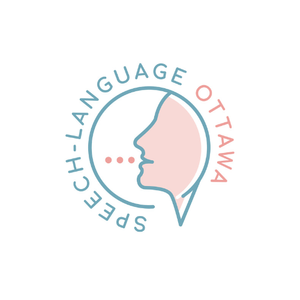Assessment | Therapy | In-Home | Virtual | Children | Adults

Services: Telehealth and in-home
Our team provides in-home services in Ottawa and telehealth services across Ontario
We offer a range of speech and language assessment and therapy services. If your concern is not listed below please call for further information.
Assessment and therapy services en Français or in English on your schedule.
Services may be delivered at home, daycare, long term care facilities, adult living centres and at some schools and include frequent updates on progress as well as strategies and home practice.
Language Delays
Language delays are delays in using words, the number of words a child has and how they are combined. If your child is not meeting their language milestones an evaluation by a certified Speech-Language Pathologist is recommended. Early intervention can make all the difference!
Your child should have 2-6 words by age one, follow simple directions and say 50 words by 18 months, and follow 2-step directions and speak in 2-word and some 3-word combinations by age 2. By age 3 he or she should speak in short phrases and by age 4 he or she should be understood by most strangers.
Language delays can persist throughout childhood. We offer a range of services to fit your child's needs and age group.
Autism and Social language
Children with autism experience an array of speech and language delays. We work with you and your child to assess your child's needs and create a treatment plan that fits. Social language includes using language for a variety of purposes, changing language to fit a situation and following rules for conversation and storytelling.
Social language is a very important part of communication as it is the allows children to communicate effectively to form relationships, participate in their environments and relate to peers.
Services for adults
We also offer a range of services for adults and teens including assessment or therapy for adults who have speech or language challenges following a stroke (aphasia), voice therapy, stuttering, accent therapy and cognitive communication therapy.
Please contact us to ask how we can support you or your family member. We provide services in-home, in long term care or rehabilitation facilities and in retirement living communities.
Articulation, Motor Speech and Phonological Delays
Articulation, motor speech, and phonological delays are delays in sound production. These types of speech sound delays can make a child difficult to understand and lead to frustration. A lisp is an example of an articulation delay.
Phonological delays consist of normal ways of changing sounds to make them easier to pronounce (i.e.: baba for bottle) that do not disappear by the expected age. Motor speech challenges are challenges planning and executing the movements for speech. Speech therapy focuses on the sounds that are challenging for your child.
Stuttering
Stuttering is characterized by repetitions of words or parts of words as well as blocks (no sound coming out despite trying to say a sound) and prolongations of speech sounds. Very frequent interjections (um, like) may also be present. Everyone has disfluencies in their speech from time to time, but people who stutter experience them more frequently. Stuttering may also be accompanied by facial or body movements, tension in the face or neck, or the perception that the speaker is out of breath.
If stuttering is affecting day-to-day communications, we can help by performing an assessment and creating a treatment plan to allow you or your child to communicate more effectively in a variety of environments.
References: College of Audiologists and Speech-Language Pathologists of Ontario, American Speech and Hearing Association
Early Literacy and Phonological Awareness
Difficulties with early literacy can include trouble knowing which sound different letters represent (phonological awareness), trouble spelling, mixing up the order of letters, difficulties with comprehension, and challenges in expressing ideas.
Delays in literacy can lead to struggles with learning new material and meeting a child's potential. Intervention for early literacy evaluates and targets your child's needs to help support him or her in challenging areas and improve their confidence and skills.
